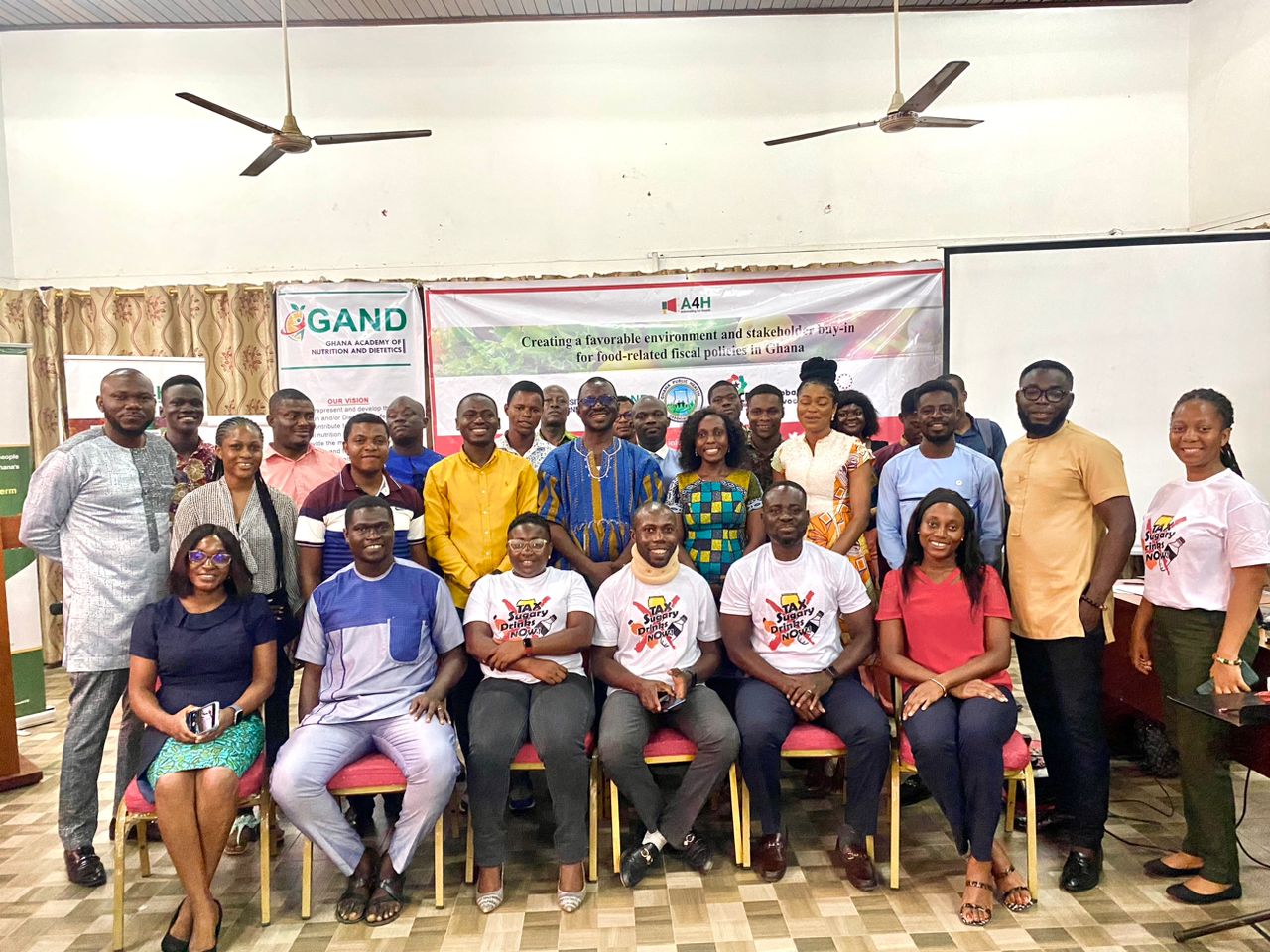General News
Media trained to educate public on dangers of Sugar Sweetened Beverages

Some Media personnel in the country have pledged to adequately educate and inform the general public on the harmful effects of consuming Sugar Sweetened Beverages (SSBS).
The journalists who made the pledge after undergoing a training session organized by the Advocacy for Health Project (A4H) in Accra on April 12, 2013, promised to be advocates for good food environment that promotes good health and wellbeing.
Advocating for Health Project (A4H) is a coalition of health experts that urged the Government of Ghana to consider imposing a tax on SSBs to make them more expensive to deter people from consuming them.
According to the A4H, the SSB products have health complications, but they are gradually becoming common on the streets of Ghana and the only way to stop people from consuming them was to make them more expensive.
Sugar sweetened beverages are any drinks that contain added sugar. This includes sodas, sports drinks, energy drinks, and fruit juices. While most people think of soda when they think of sugar sweetened beverages, any drink with added sugar counts. While these beverages can be tasty, they can also be harmful to one’s health.
Taking the journalists through a session on “The effect of SSB on nutritional wellbeing and health”, Prof. Reginald Annan of the Kwame Nkrumah University of Science and Technology and Chair of the GAND Nutrition Group, observed that the biggest problem with SSBs is that they are loaded with empty calories.
“A can of soda has about 9 cubes of sugar with 150 calories and no nutritional value whatsoever. Drinking just one can of soda a day can lead to weight gain and an increased risk for obesity,” he noted.
To put it in perspective, one has to walk for 30 minutes or more in order to get rid of the sugar consumed in one can of soda.
He further added that SSBs are also linked to type 2 diabetes. The sugar in these beverages raises your blood sugar levels, which can damage your pancreas and lead to insulin resistance. This increases your risk for developing type 2 diabetes.
He said research has shown that these sugary beverages are associated with dental caries, obesity, diabetes, stroke and many other non-communicable diseases.
Ghana is experiencing a surge in non-communicable diseases (NCDs) amidst food insecurity, micronutrient malnutrition, and infectious morbidities,” Prof. Annan warned.
A study conducted by the A4H project indicated that, 42% of students between the ages of 3 years and 10 years consume SSB daily putting their future and that of the country at high risk, thus there was the need for drastic and pragmatic mechanisms to deal with the situation.
These products are on display everywhere including shops, schools, churches, markets around banks and in hospitals, and they are killing the populace slowly and silently.
Regular consumption of SSBs, including soft drinks, flavoured milks, energy drinks, vitamin waters, fruit juices and sweetened iced teas, is associated with an increased risk of dental cavities, type 2 diabetes, weight gain and obesity in both children and adults, heart disease, stroke and cancer.
The Ghana Demographic and Health Survey reports that the proportion of the adult population (female) that is overweight or obese in Ghana increased from 10% in 1993 to 40% in 2015.
High blood pressure, elevated fasting plasma glucose, dietary risk factors of NCDs, and high body mass index are among the top 10 risk factors that drive the most death and disability combined. It has been estimated that over one-third of all adult deaths are due to NCDs,” Prof. Kingley Pereko, president of the Ghana Academy of Nutrition and Dietetics (GAND) cautioned in his welcome address.
Prof. Pereko added that the implication of these on the economy was enormous as it cost Ghana huge sums to treat diabetes related sickness yearly.
So, if we can change the way we eat and eat healthy diets we would be able to address diet-related non-communicable diseases such as diabetes, as well as obesity and save the country a lot of money”, he urged.
Ghana cannot afford the epidemic proportions of the Non-Communicable Diseases levels as the health care system cannot take care of people who are sick, urging public health nutritionists to intensify the campaign to protect the health of the citizens.
He therefore urged the citizens to adhere to health safety protocols and heed to the call to avoid intake of sugar sweetened beverages to remain healthy and productive.
Stressing the importance of the project, Prof. Pereko said the A4H project will create a favourable food environment and stakeholder buy-in for food-related fiscal policies including SSB tax in Ghana.
The A4H project is a collaboration between Academia led by the School of Public Health, University of Ghana, Legon, and Civil Society Organizations (CSOs) in Ghana led by Ghana NCD Alliance (GhNCDA), Ghana Public Health Association (GPHA) and Ghana Academy of Nutrition and Dietetics (GAND).
By Derrick Botsyoe
-

 Business1 week ago
Business1 week agoQNET Triumphs at PR Awards 2024 with Three Prestigious Wins
-

 Business4 days ago
Business4 days agoLagos State Officials Praise Jospong Group’s Eco-friendly Waste Management Module, Eyes Similar Module
-

 General News2 weeks ago
General News2 weeks agoMawuena Trebarh passes on at 52
-

 Entertainment4 weeks ago
Entertainment4 weeks agoMassive turnout at MTN SIW in Kumasi, ACP Kofi Sarpong lauds organisers
-

 AgriBusiness3 weeks ago
AgriBusiness3 weeks agoAfrica’s Agrifood Entrepreneurs Called to Action: Applications Open for the US$100,000 GoGettaz Agripreneur Prize Competition
-

 Technology3 weeks ago
Technology3 weeks ago“AI is about partnerships, collaboration not replacement” -Bernard Acquah
-

 Company/Corporate News3 weeks ago
Company/Corporate News3 weeks agoQNET engages Stakeholders to mark 2024 World Health Day
-

 Education2 weeks ago
Education2 weeks agoUCC Council Chairman Creates Commotion Over Appointment of Registrar And Director of Human Resources




